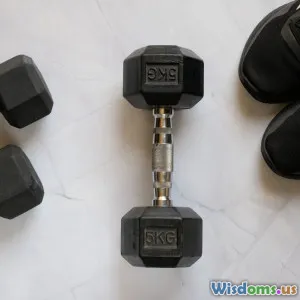
Maximizing Your Workout Efficiency
7 min read Unlock the secrets to maximizing your workout efficiency with expert tips and strategies to enhance your fitness routine. (0 Reviews)
Maximizing Your Workout Efficiency
Every fitness enthusiast dreams of achieving the best results from their hard-earned time spent working out. But with a plethora of information available today and various trends emerging constantly, knowing how to maximize workout efficiency can seem daunting. The secret lies in effective strategy and understanding how your body functions during exercise. In this article, we will explore practical insights into getting the most out of your workouts through sports science and health principles.
The Science of Efficient Workouts
Before creating a structured plan, it's important to understand the science behind fitness.
Understanding Energy Systems
In sports science, the body utilizes three primary energy systems during exercise: the phosphagen system, anaerobic system, and aerobic system. Choosing the right exercises and duration can significantly affect efficiency.
- Phosphagen System: Fuels high-intensity, short-duration exercises (e.g., weightlifting). Efficiency peaks when shorter reps, high intensity cycles are followed.
- Anaerobic System: Activates during moderate-to-high intensity efforts lasting about 30 seconds to two minutes (e.g., sprinting). Engagement leads to increased muscle endurance and power, crucial for improved performance.
- Aerobic System: The endurance component takes effect during low-to-moderate intensity work over a longer time-frame (e.g., marathon running).
Recognizing these systems allows one to structure workouts accordingly to ensure varied intensity, which boosts overall results over time.
Personalization and Assessment
Before commencing any training, knowing your baseline fitness level is essential. Consider conducting an assessment of your endurance, strength, flexibility, and body composition. Many gyms or professional trainers offer assessment services that help tailor workout plans specifically for you.
Strategies to Maximize Workout Efficiency
Now that the foundational knowledge is established, let’s get into the principles and actionable strategies.
1. Incorporate Interval Training
Interval training alternates between high-intensity bursts and active recovery, which has been thoroughly documented for its effectiveness in burning fat and increasing cardio fitness. A study published in the British Journal of Sports Medicine found that participants who implemented high-intensity interval training (HIIT) achieved increased VO2 max (a measure of aerobic fitness) and reduced body fat percentage compared to those engaging in traditional moderate-intensity workouts.
- Example of HIIT Routine: 30 seconds of sprinting followed by 1 minute of walking, repeated for 20 minutes.
2. Optimize Your Nutrition
Dietary habits significantly influence workout efficiency. Consuming the right nutrients pre- and post-workout can enhance performance and recovery. According to a 2020 study in the Journal of Sports Sciences, a balanced diet rich in proteins and complex carbohydrates promotes muscle repair and energy replenishment, critical for high-efficiency workouts.
- Before Workout: A meal rich in complex carbohydrates (e.g., oats) can provide lasting energy during training.
- Recovery Nutrition: Incorporating protein within the first 30 minutes post-exercise aids in muscle synthesis.
3. Harness the Power of Recovery
Overtraining can lead to burnout and decreased performance. Implementing recovery days, sleep hygiene, stretching, and techniques like yoga or foam rolling helps the body recover and prepares it for future sessions.
- Example of a Recovery Routine: Taking a rest day after intensive training, integrating light activities (e.g., a leisurely walk), and using foam rollers on sore muscles to improve blood flow.
4. Engage in Strength Training
Resistance training can yield more efficient results over time. According to the American College of Sports Medicine, a consistent strength training regimen can enhance metabolic rate, leading to improved fat loss, optimizing every workout session.
- Aim for at least two days of strength work each week, focusing on compound movements like squats, deadlifts, and pressing exercises that engage multiple muscle groups.
5. Cultivate a Positive Mindset
Your mental approach to fitness is just as vital as physical routines. Positive reinforcement, goal setting, and a focused mindset enhance performance during workouts. Research shows individuals who visualize their workout achievement improve their performance outcomes. They stay focused, thereby increasing efficiency.
- Example Techniques: Setting Specific, Measurable, Achievable, Relevant, Time-bound (SMART) goals enhances motivation. For example, aiming to run a specific distance within a set timeframe each week encourages progression.
Conclusion
Maximizing workout efficiency requires an understanding of your body's energy systems and how external factors like nutrition, recovery, and strength impact performance. To cultivate an effective workout habit, explore various strategies that are applicable to your lifestyle, and adjust actions based on your presence in health metrics and psychological wellbeing. The beauty of achieving your fitness goals comes down to consistent, informed choices—those that make every rep, every minute, and every calorie count. Engage with each principle mindfully, and you'll not only boost your efficiency but also enhance the joy derived from a healthy, active lifestyle.
Empower yourself through continued education, be curious about how your body operates, and be gentle with yourself as you challenge your limits. With diligence, you will proudly notice progress that aligns with dedication toward maximizing workout efficiency.
Remember, it’s about improving, one workout at a time!
Rate the Post
User Reviews
Popular Posts

















